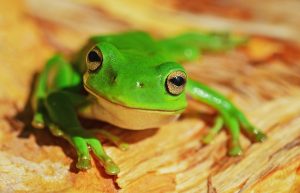Diversity of important frog species is enhanced by organic production in rice fields
 Photo Credit: David Clode
Photo Credit: David Clode
A study published in the Journal Herpetological Review found a greater diversity of anurans (frogs, toads and tree frogs) in organic rice fields versus conventional. In one of the largest rice-producing regions of Argentina, the researchers attribute their findings of greater species diversity to the lack of chemical use, reduced nutrient leaching and soil erosion, and more vegetation along the field edges under organic management. Conventional management of rice in this region is chemically intensive and typically utilizes: aerial applications by plane of glyphosate herbicides, early applications of synthetic fertilizers, strong pesticides including organophosphates and pyrethroids to control insects during flowering, and fungicides that are often mixed and applied with the pesticides. The authors point out that amphibians such as frogs naturally keep pests at bay and are important indicators of environmental quality. This study highlights how organic management supports critical biodiversity, which provides more function for the farmers and indicates a healthier, safer environment for people.



